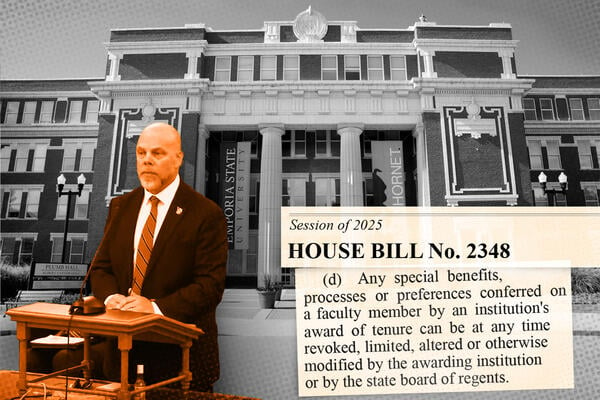Kansas lawmakers are considering a bill that would sap tenure of its meaning for faculty at the state’s public colleges and universities.
House Bill 2348, introduced this month in the Kansas Legislature, doesn’t specifically say it would ban tenure. But according to the proposed law, “any special benefits, processes or preferences conferred on a faculty member” by tenure “can be at any time revoked” by a higher education institution or the Kansas Board of Regents, which governs the state’s public universities. It also says tenure wouldn’t “create any entitlement, right or property interest in a faculty member’s current, ongoing or future employment.”
The bill would end such rights not just for future “tenure” earners but for already tenured professors, too. Mallory Bishop, a nontenured instructor at Emporia State University who serves as faculty president, said HB 2348 would “remove the core premise of tenure,” which is “you cannot be fired without cause.”
“The bill itself seems to remove everything except the name of tenure,” Bishop said.
It’s part of a growing trend among Republican lawmakers in multiple states seeking to weaken or eliminate tenure in public institutions. Ohio’s Senate passed a bill this year that would weaken tenure, though the House hasn’t yet followed suit. So far, no state has fully banned tenure at public institutions.
But the Kansas bill is noteworthy for its origins. The Board of Regents and the state’s two top research universities publicly oppose it. So where did it come from?
Steven Lovett, general counsel for Emporia State University, says he wrote it. And the top of the bill includes one sentence saying a lawmaker requested it on Lovett’s behalf.
The bill materialized after Emporia State suffered a setback in its continued defense against a federal lawsuit filed by 11 tenured professors whom the university decided to lay off in 2022. A judge—rebuffing the university defendants’ request to toss out the suit—allowed the faculty to move forward with their allegations that they weren’t provided sufficient due process. Emporia State officials, including Lovett himself, are among the defendants in the continuing suit.
Those faculty were among 23 tenured professors whom Emporia State laid off, citing financial pressures and other possible reasons. The university’s handling of the situation led the American Association of University Professors to censure the institution. The controversy presaged layoffs over the past two years by other U.S. universities, which also cited financial concerns and didn’t spare tenured faculty. West Virginia University made headlines in 2023 for axing a swath of tenured faculty, followed by the University of Wisconsin at Milwaukee and Western Illinois University.
A university spokesperson wrote in a statement to Inside Higher Ed that Emporia State supports tenure and that Lovett’s “submission of this bill comes as a surprise to the university.” But the statement also defended Lovett’s “constitutional right” as “a private citizen” to submit the legislation.
The statement doesn’t say whether the university supports or opposes the bill. Emporia State didn’t provide an interview or respond to written questions about its position on the legislation.
Bishop said she’s asked top university officials for their stance but hasn’t received an answer; she said university president Ken Hush told her in a private conversation that even if the bill were to pass, “tenure still exists.” Lovett—saying he was commenting as a private citizen—has told lawmakers that universities that speak out against the bill are violating state law.
And while the university says it was surprised by Lovett’s submission of the bill, an online video of an earlier legislative hearing shows Hush appearing to urge lawmakers to support similar legislation not long before his top lawyer introduced it.
Reversing a Court Loss?
The university attempted to dismiss the laid-off professors’ lawsuit by arguing that tenure didn’t give them a “property right” to continued employment. “Property right,” or “property interest,” is a legal term, and if tenured professors possess this right, it could mean they should have received due process before being ousted, in accordance with the 14th Amendment.
In December, a U.S. district court judge in Kansas allowed the case to progress, ruling that the professors’ legal complaint sufficiently alleged that the faculty did have so-called property rights to keep their jobs. The case continues.
As the Kansas Reflector previously reported, a Kansas House Higher Education Budget Committee member asked Hush about the suit during a Jan. 31 hearing. According to a video of the proceedings, Hush said the property right ruling “means an entitlement and job forever, until this is settled in some form. Obviously, as a state agency, we’re working with the attorney general on this. And the other option to correct that is via legislation.”
About a week later, House Bill 2348 appeared at the request of Representative Steven K. Howe—who chairs the committee Hush spoke to—on behalf of Lovett. Howe declined to comment for this article.
The bill, however, is currently before the House Judiciary Committee—not Howe’s committee. Lovett advocated for the legislation during a Feb. 11 Judiciary hearing, in which he was introduced as “Mr. Steven Lovett, private citizen.” Lovett told the lawmakers the university didn’t encourage him to write the bill “and had no knowledge of it before I submitted it.”
He said the bill “eliminates the property right of tenure but not tenure itself.” The idea that tenure is a property right “obligates Kansans to a long-term, unfunded fiscal liability,” he said, adding that the due process required to oust tenured faculty “costs even more.” He argued the First Amendment makes tenure and due process unnecessary to protect academic freedom.
“A nontenured faculty member enjoys as much legal protection to pursue academic freedom as a tenured faculty member,” he said. Tenure “primarily results in nothing more than personal gain.”
Lovett said Board of Regents members echoed part of his arguments amid the lawsuit filed by the laid-off professors, arguing that any universities that opposed the bill would be violating state law that says the board manages public universities. As of now, though, a judge has dismissed all board members as defendants, leaving only Lovett, Hush and one retired Emporia State official facing the lawsuit.
At the end of his speech, Lovett, who’s also an associate professor of business law and ethics at Emporia State, publicly renounced the tenure the university gave him.
Doug Girod, chancellor of the University of Kansas, followed Lovett at the lectern.
“I don’t believe I’m breaking the law, because I am here with the full knowledge of my board,” Girod said. Eradicating “meaningful tenure” would mean losing “our best faculty, and we will not be able to replace them,” he said.
After Kansas State University’s president spoke against the bill, Blake Flanders, the top administrator at the Board of Regents, told lawmakers the board is also against it, citing similar recruitment and retention concerns. Further, his written testimony suggested he doesn’t buy Lovett’s argument that he’s acting as a private citizen.
He pointed out that Board of Regents policy requires legislative proposals from institutions it governs first be presented to the board for approval “before being submitted to the Legislature.” He wrote, “That policy was not adhered to in the case of this bill.” A board spokesperson didn’t provide Inside Higher Ed an interview or answer written questions about whether the board is pushing for Lovett to be disciplined.
Even if the bill passes, it’s unclear whether it would actually help Emporia State in its current suit or erase the meaning of tenure for other Kansas faculty who have already earned it. J. Phillip Gragson, attorney for the laid-off professors, said in an email that that would be unconstitutional.
“While the state can certainly commit higher education academic and economic suicide by passing a bill that eliminates tenure prospectively only if it wants, the state cannot take away tenure rights from those professors who have already obtained tenure without due process,” he wrote.








